Projects
Completed Research Projects
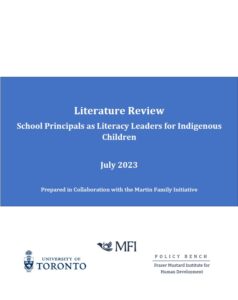 Literature Review – School Principals and Literacy Leaders for Indigenous Children (July 2023)
Literature Review – School Principals and Literacy Leaders for Indigenous Children (July 2023)
This literature review summarizes the available literature on the role of school principals as literacy leaders for Indigenous children, including a summary of best practices as well as challenges. Given the importance of literacy to culture, language, socio-emotional development, and overall health and well-being in children, promoting strong literacy skills among students is an essential goal for school leaders. A better understanding of how school leadership can best support literacy learning among Indigenous children in a school context has important practical implications for the development of effective and equitable literacy programs and initiatives for students as well as literacy training and other professional development programs for school leaders.
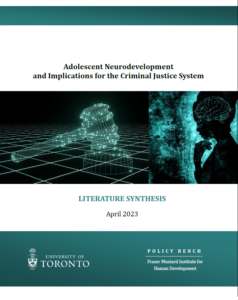 Literature Synthesis – Adolescent Neurodevelopment and Implications for the Criminal Justice System (April 2023)
Literature Synthesis – Adolescent Neurodevelopment and Implications for the Criminal Justice System (April 2023)
Although adolescents continue to be overrepresented in the justice system, current approaches to criminal justice in Canada do not recognize the critical period of adolescence – resulting in a disconnect between what is currently known about adolescent development and policy responses to adolescent criminal behaviour. This report examines evidence related to adolescent misconduct from a transdisciplinary perspective, with a focus on the role of neurodevelopmental factors in understanding and addressing this behaviour. Implications for policy, including the use of alternative justice responses, are also discussed.
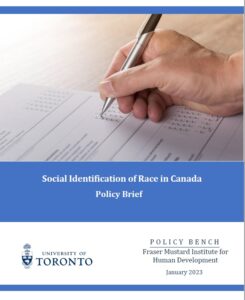 Social Identification of Race in Canada – Policy Brief and Fact Sheet (January 2023)
Social Identification of Race in Canada – Policy Brief and Fact Sheet (January 2023)
This policy brief reviews the literature on the collection of race and identity-based data (including Indigenous identities) with a focus on Ontario. Examples of recent initiatives and data collection methods used in various sectors within the province and from other jurisdictions (e.g. health care, schools, justice, social services, government) are examined and compared to help inform our understanding of best practices and challenges with the collection, reporting, and governance of reliable race and identity-based data. Evidence on the practice of social identification is reviewed, including its accuracy, impacts, and associated health outcomes. Recommendations based on the available literature are also provided.
A fact sheet summarizing the information in the policy brief is also available.
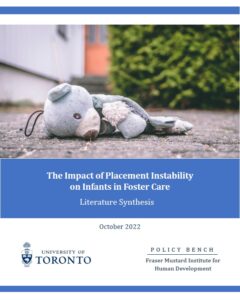 Literature Synthesis: The Impact of Placement Instability on Infants in Foster Care (October 2022)
Literature Synthesis: The Impact of Placement Instability on Infants in Foster Care (October 2022)
Research on child development and attachment clearly shows the benefits of consistency, continuity, and predictability in a child’s caregiving environment – particularly during the period of infancy and early childhood when critical processes for social, emotional, and physical development are occurring. This is especially important for infants and children in foster care, yet many of these children experience multiple moves between caregivers and settings while they are in out-of-home care. This report examines evidence on the potential short- and long-term consequences of placement disruption or instability, with a focus on any differences between infants and older children. Implications for child welfare practice and policy are also discussed.
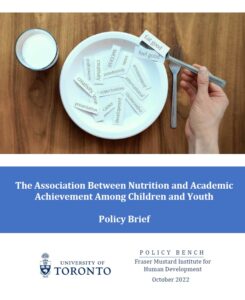 Policy Brief: The Association Between Nutrition and Academic Achievement Among Children and Youth (October 2022)
Policy Brief: The Association Between Nutrition and Academic Achievement Among Children and Youth (October 2022)
There is a clear link between health and education, yet food insecurity remains a serious issue for children in Canada, especially in the context of the recent COVID-19 pandemic and its ongoing economic impacts. This policy brief reviews the evidence on the association between academic achievement and nutritional factors (i.e. food security, healthy diet, obesity) among children and youth, with a focus on the role of the school food environment, including the impact of school food programs. Implications and recommendations for future research and policy are also presented.
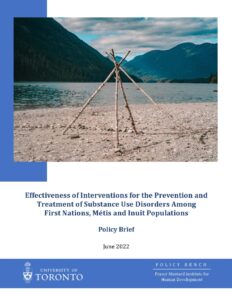 Policy Brief: Effectiveness of Interventions for the Prevention and Treatment of Substance Use Disorders Among First Nations, Métis and Inuit Populations (June 2022)
Policy Brief: Effectiveness of Interventions for the Prevention and Treatment of Substance Use Disorders Among First Nations, Métis and Inuit Populations (June 2022)
First Nations, Métis and Inuit (FNMI) peoples in Canada experience greater social and health inequities that stem from the intergenerational effects of colonialism, racism, and other discriminatory policies — leading to a disproportionately greater risk of negative health outcomes including higher rates of problematic substance use. There is a clear need for more effective prevention and intervention strategies to reduce the harms associated with problematic substance use among FNMI populations. This policy brief examines the literature on the efficacy of interventions for the prevention and treatment of substance use disorders in FNMI populations, with a focus on cultural and needs-based interventions that are reflective of the distinct community circumstances. Key findings as well as implications based on the available evidence are discussed. In the long term, significant changes to health and social systems are needed in ways that support healthy behaviours and remove barriers to treatment and care for FNMI peoples with substance use issues in Canada.
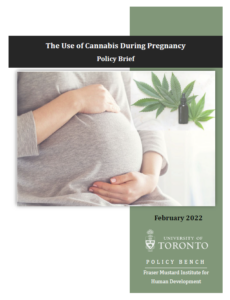 Policy Brief: The Use of Cannabis During Pregnancy (February 2022)
Policy Brief: The Use of Cannabis During Pregnancy (February 2022)
The legalization of recreational cannabis in 2018 is rapidly changing the social landscape of Canada as its acceptance and accessibility grows. This policy brief examines the safety and effects of cannabis use among a specific segment of Canada’s population – pregnant women. Patterns of increased cannabis consumption and the perception of cannabis as safe among Canadians, including pregnant women, may have potential consequences for the health and well-being of the fetus and child. As the cannabis market evolves, more evidence-based research will be needed to address knowledge gaps and ensure that expectant parents – along with the broader public – have adequate information about cannabis consumption and its associated risks to make informed decisions for their own health and the health of their child(ren).
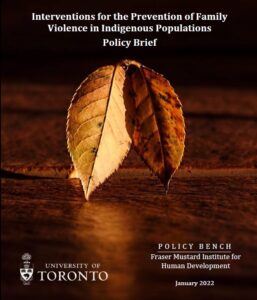 Policy Brief (Jan 2022) and Fact Sheet (Jan 2022): Interventions for the Prevention of Family Violence in Indigenous Populations
Policy Brief (Jan 2022) and Fact Sheet (Jan 2022): Interventions for the Prevention of Family Violence in Indigenous Populations
This policy brief and the accompanying fact sheet examine interventions for the prevention of family violence in Indigenous populations, with a focus on intimate partner violence (IPV) and child maltreatment. Indigenous considerations and principles to inform the development of targeted and effective approaches to interventions are also reviewed.
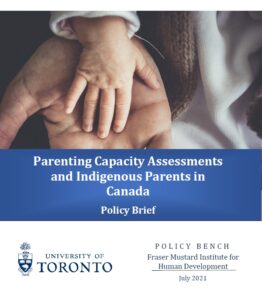 Policy Brief (July 2021) and Fact Sheet (Jan 2022): Parenting Capacity Assessments and Indigenous Parents in Canada
Policy Brief (July 2021) and Fact Sheet (Jan 2022): Parenting Capacity Assessments and Indigenous Parents in Canada
Parental capacity assessments (PCAs) are an integral component of a child welfare practitioner’s toolkit for evaluating parenting competence. This policy brief examines the applicability of PCAs to a well-defined group of Canada’s population—Indigenous parents. Findings indicate that PCAs, in their current form, are not appropriate tools for Indigenous parents, due to a number of factors such as inherent biases and culturally inappropriate assessments methods. Recommendations to address these limitations are also presented.
 Literature Scan (June 2021) and Fact Sheet (Jan 2022): The Efficacy of Birth Alerts
Literature Scan (June 2021) and Fact Sheet (Jan 2022): The Efficacy of Birth Alerts
In Canada, the practice of birth alerts has garnered considerable debate among child welfare advocates, practitioners, legal professionals and professional child welfare organizations regarding their efficacy in ensuring the safety and well being of children. However, there is limited evidence-based research assessing the efficacy of birth alerts. This literature scan and accompanying fact sheet explore the practice, prevalence, status, and impacts of birth alerts across Canada – particularly for Indigenous families.
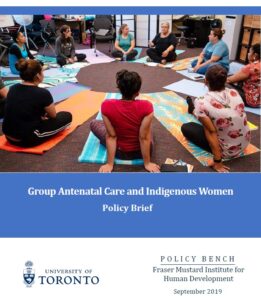 Policy Brief (Sept 2019) and Fact Sheet (Jan 2022): Group Antenatal Care and Indigenous Women
Policy Brief (Sept 2019) and Fact Sheet (Jan 2022): Group Antenatal Care and Indigenous Women
Group antenatal care (GAC) is becoming more commonly accepted by policymakers and health practitioners as an alternative to traditional antenatal care approaches. This fact sheet reviews and assesses the efficacy of GAC as a possible model for the delivery of more effective and equitable antenatal care to Indigenous women in Canada.
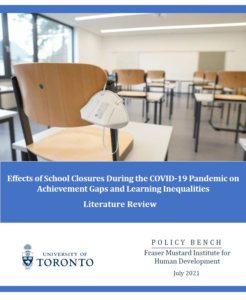 Literature Review and Policy Brief: Effects of School Closures During the COVID-19 Pandemic on Achievement Gaps and Learning Inequalities (July 2021)
Literature Review and Policy Brief: Effects of School Closures During the COVID-19 Pandemic on Achievement Gaps and Learning Inequalities (July 2021)
Research prior to the COVID-19 pandemic has shown that long absences from schools and interruptions in instruction time have adverse effects on academic achievement, and that the negative consequences may be greater for students from disadvantaged backgrounds, resulting in a widening of SES-based achievement gaps. This report aims to extend this evidence base by reviewing the literature on academic achievement gaps and learning loss in relation to school closures as well as emerging studies on the short- and long-term effects of recent school closures on achievement gaps in the context of the COVID-19 pandemic (see Literature Review document). Implications for schools, teachers, students, and educational systems are also discussed in the associated Policy Brief.
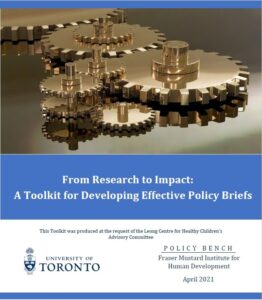 Toolkit: From Research to Impact: A Toolkit for Developing Effective Policy Briefs (April 2021)
Toolkit: From Research to Impact: A Toolkit for Developing Effective Policy Briefs (April 2021)
This toolkit provides an informative guide for researchers on the development of effective policy briefs to communicate research findings to policymakers, with the aim of supporting evidence-informed decision-making. Relevant examples, tips, resources, and checklists are also provided to maximize the impact of the policy brief
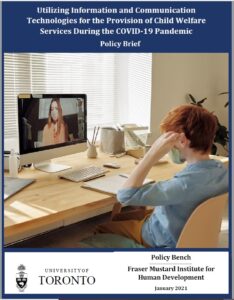 Policy Brief: Utilizing Information and Communication Technologies for the Provision of Child Welfare Services During the COVID-19 Pandemic (January 2021)
Policy Brief: Utilizing Information and Communication Technologies for the Provision of Child Welfare Services During the COVID-19 Pandemic (January 2021)
The COVID-19 pandemic created a gap in service delivery for child welfare services, despite the increased need for support for children and families. Policymakers now have a unique opportunity to plan for a more effective child welfare system that incorporates information & communication technologies (ICT) in the implementation of services and programs. This brief examines evidence from pre- and post-pandemic on efficacy of ICT for child welfare service delivery, including challenges and recommendations.
 Literature Scan: Children Aging Out of Care (December 2020)
Literature Scan: Children Aging Out of Care (December 2020)
Studies have consistently shown that youth who age out of care face numerous challenges and poorer life outcomes compared to their peers. The aim of this literature scan was to explore research on interventions or policies that might improve the transition process and outcomes for children and youth aging out of care in Ontario and any evidence on their effectiveness.
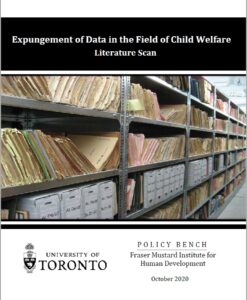 Literature Scan: Expungement of Data in the Field of Child Welfare (October 2020)
Literature Scan: Expungement of Data in the Field of Child Welfare (October 2020)
Child welfare agencies maintain records of all reports of child maltreatment and their outcomes in their information systems for the purposes of investigation, treatment, and prevention of child abuse and neglect; however the potential negative consequences of these systems for families and individuals have resulted in calls for reform. This literature scan explores available literature on the issue of data expungement from child welfare databases and synthesizes the arguments for and against expungement, to help inform future policies in Canada.
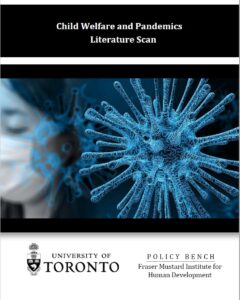 Literature Scan: Child Welfare and Pandemics (March 2020)
Literature Scan: Child Welfare and Pandemics (March 2020)
This literature scan identifies and synthesizes existing literature examining the effects of pandemics and the identification of policy solutions to mitigate their effects on a well-defined group of Canada’s population—children in the care of Canada’s child welfare system.In the face of pandemics such as COVID-19, it is essential that child welfare systems have the capacity and resources to: respond to increased demands for supports and services; minimize the effects on vulnerable populations; and ensure continuity of care.